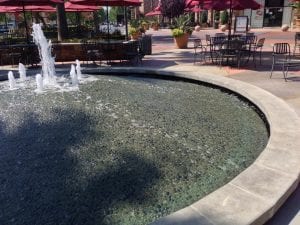
Having been on lockdown for most of the past year, it’s been fun to sit at our local outdoor food court as things are re-opening. There is a huge round fountain in the center. The raised edge encircling the fountain is about 18 inches wide.
What is such fun about this fountain is watching little children with their cute little (COVID) masks run around the edge of it with absolute delight and laughter.
There are two things that particularly strike me when I watch these little children.
First, I am amazed at the coordination of the toddlers and slightly older siblings that play this running game around the fountain. While there are occasional falls, these children show astonishing awareness and control of their bodies and movement.
Second, the children running and playing around the fountain have no toys, no electronic devices, no structured rules. They’re just making it up as they go along. And guess what. They are:
- totally engaged
- having fun
- getting exercise
- using creative thinking
- interacting with their siblings
- building balance, visual skills, and motor planning abilities.
Believe it or not, this unstructured movement play is
building skills that children need for
paying attention and learning in the classroom.
John Ratey, M.D., author of A User’s Guide to the Brain says, “Mounting evidence shows that movement is crucial to every other brain function, including memory, emotion, language and learning. Our “higher” brain functions have evolved from movement and still depend on it.”
When children (or adults) struggle to learn or function easily in their lives, one of the first things we need to look at is what we call Core Learning Skills. These are foundational visual and movement skills that allow us to move easily through our environment and our social and academic worlds. These skills, which develop through movement, support memory, attention, and organization.
As a society, we have gotten very enamored with our electronic devices – and I have to admit, they are quite amazing. But one of the very best gifts we can give to our children is the opportunity to move and create with unstructured playtime.
Do you have a struggling student?
When students struggle with learning or attention, it is almost always because there are underlying supporting skills that are not serving them well enough. These are skills such as memory, focus, auditory or visual processing, sensory and/or motor skills, and executive function.
By identifying and addressing the inefficient underlying developmental or processing skills, most learning and attention challenges can be dramatically improved or completely corrected.
To learn more about why some bright students struggle in school and how to change that permanently, CLICK HERE
Let us help you figure out and correct the root of the problem and remediate whatever academic skills have been affected. This also is a life-changing gift you can give to yourself or your child.
To schedule a FREE consultation to speak to someone about your child, give us a call at 877-774-0444 or CLICK HERE.
Ready to take the next step?
Speak to a Learning Specialist to learn more about the results from students and parents at Stowell Learning Centers.
